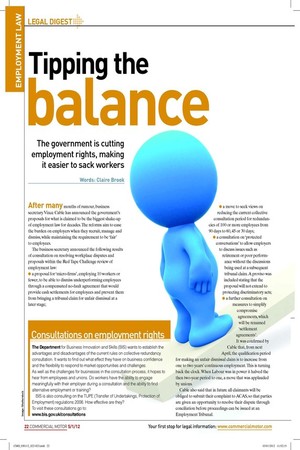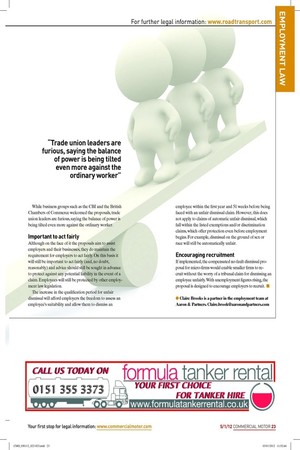Tipping the
Page 18

Page 19

If you've noticed an error in this article please click here to report it so we can fix it.
balance
The government is cutting employment rights, making it easier to sack workers
Words: Claire Brook
After many months of rumour, business secretary Vince Cable has announced the government’s proposals for what is claimed to be the biggest shake-up of employment law for decades. The reforms aim to ease the burden on employers when they recruit, manage and dismiss, while maintaining the requirement to be ‘fair’ to employees.
The business secretary announced the following results of consultation on resolving workplace disputes and proposals within the Red Tape Challenge review of employment law: • a proposal for ‘micro-irms’, employing 10 workers or fewer, to be able to dismiss underperforming employees through a compensated no-fault agreement that would provide cash settlements for employees and prevent them from bringing a tribunal claim for unfair dismissal at a later stage; • a move to seek views on reducing the current collective consultation period for redundancies of 100 or more employees from 90 days to 60, 45 or 30 days; • a consultation on ‘protected conversations’ to allow employers to discuss issues such as retirement or poor performance without the discussions being used at a subsequent tribunal claim. A proviso was included stating that the proposal will not extend to protecting discriminatory acts; • a further consultation on measures to simplify compromise agreements, which will be renamed ‘settlement agreements’.
It was conirmed by Cable that, from next April, the qualiication period for making an unfair dismissal claim is to increase from one to two years’ continuous employment. This is turning back the clock. When Labour was in power it halved the then two-year period to one, a move that was applauded by unions.
Cable also said that in future all claimants will be obliged to submit their complaint to ACAS, so that parties are given an opportunity to resolve their dispute through conciliation before proceedings can be issued at an Employment Tribunal. While business groups such as the CBI and the British Chambers of Commerce welcomed the proposals, trade union leaders are furious, saying the balance of power is being tilted even more against the ordinary worker.
Important to act fairly
Although on the face of it the proposals aim to assist employers and their businesses, they do maintain the requirement for employers to act fairly. On this basis it will still be important to act fairly (and, no doubt, reasonably) and advice should still be sought in advance to protect against any potential liability in the event of a claim. Employees will still be protected by other employment law legislation.
The increase in the qualiication period for unfair dismissal will afford employers the freedom to assess an employee’s suitability and allow them to dismiss an employee within the irst year and 51 weeks before being faced with an unfair dismissal claim. However, this does not apply to claims of automatic unfair dismissal, which fall within the listed exemptions and/or discrimination claims, which offer protection even before employment begins. For example, dismissal on the ground of sex or race will still be automatically unfair.
Encouraging recruitment
If implemented, the compensated no-fault dismissal proposal for micro-irms would enable smaller irms to recruit without the worry of a tribunal claim for dismissing an employee unfairly. With unemployment igures rising, the proposal is designed to encourage employers to recruit. ■
● Claire Brooks is a partner in the employment team at Aaron & Partners. Claire.brook@aaronandpartners.com
Consultations on employment rights
The Department for Business Innovation and Skills (BIS) wants to establish the advantages and disadvantages of the current rules on collective redundancy consultation. It wants to find out what effect they have on business confidence and the flexibility to respond to market opportunities and challenges. As well as the challenges for businesses in the consultation process, it hopes to hear from employees and unions. Do workers have the ability to engage meaningfully with their employer during a consultation and the ability to find alternative employment or training?
BIS is also consulting on the TUPE (Transfer of Undertakings, Protection of Employment) regulations 2006. How effective are they?
To visit these consultations go to: www.bis.gov.uk/consultations













































